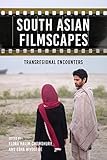South Asian filmscapes : transregional encounters / edited by Elora Halim Chowdhury and Esha Niyogi De.
Material type: TextPublisher: Pakistan : University of Washington Press, 2020Description: x, 302 pagesContent type: text Media type: unmediated Carrier type: volumeISBN: 9780295747842; 9780295747859Subject(s): Motion pictures -- South Asia -- History -- 20th century -- Congresses | Motion pictures -- South Asia -- History -- 21st century -- Congresses | Motion picture industry -- South Asia -- History -- 20th century -- Congresses | Motion picture industry -- South Asia -- History -- 21st century -- Congresses | National characteristics in motion pictures -- CongressesAdditional physical formats: Online version:: South Asian filmscapesDDC classification: 791.43 CHO LOC classification: PN1993.5.S64 | S67 2021Summary: "According Esha De and Elora Chowdhury, the legacies of industrial and independent cinemas in the subcontinent of South Asia reveal an intertwining of South Asian histories that show geopolitical and social boundaries to be both porous and hybrid. On the one hand, cinematic portrayals encode the effects of the massive geopolitical rifts born in postcolonial south Asia of religious, linguistic, and ethnic conflicts--the primary being the India-Pakistan Partition (1947) and the Bangladesh Liberation War (1971). Practices and policies of cinema in the nation-states (India, Pakistan, Bangladesh) likewise reinforce prevailing hierarches of identity and belonging. On the other hand, the combined histories of cinema and sociality in the South Asian region are replete with cross fertilization the effects of which lingered on well past the Partition of India and Pakistan and the birth of Bangladesh. The essays in this volume reveal ways in which fixed notions of national identity have been destabilized by the cross-border mobility of filmed arts and practitioners across South Asia and interrogate how filmic politics intersect with discourses around nationalism, sexuality and gender, religion, and language"-- Provided by publisher.
TextPublisher: Pakistan : University of Washington Press, 2020Description: x, 302 pagesContent type: text Media type: unmediated Carrier type: volumeISBN: 9780295747842; 9780295747859Subject(s): Motion pictures -- South Asia -- History -- 20th century -- Congresses | Motion pictures -- South Asia -- History -- 21st century -- Congresses | Motion picture industry -- South Asia -- History -- 20th century -- Congresses | Motion picture industry -- South Asia -- History -- 21st century -- Congresses | National characteristics in motion pictures -- CongressesAdditional physical formats: Online version:: South Asian filmscapesDDC classification: 791.43 CHO LOC classification: PN1993.5.S64 | S67 2021Summary: "According Esha De and Elora Chowdhury, the legacies of industrial and independent cinemas in the subcontinent of South Asia reveal an intertwining of South Asian histories that show geopolitical and social boundaries to be both porous and hybrid. On the one hand, cinematic portrayals encode the effects of the massive geopolitical rifts born in postcolonial south Asia of religious, linguistic, and ethnic conflicts--the primary being the India-Pakistan Partition (1947) and the Bangladesh Liberation War (1971). Practices and policies of cinema in the nation-states (India, Pakistan, Bangladesh) likewise reinforce prevailing hierarches of identity and belonging. On the other hand, the combined histories of cinema and sociality in the South Asian region are replete with cross fertilization the effects of which lingered on well past the Partition of India and Pakistan and the birth of Bangladesh. The essays in this volume reveal ways in which fixed notions of national identity have been destabilized by the cross-border mobility of filmed arts and practitioners across South Asia and interrogate how filmic politics intersect with discourses around nationalism, sexuality and gender, religion, and language"-- Provided by publisher.
| Item type | Current library | Collection | Call number | Status | Date due | Barcode |
|---|---|---|---|---|---|---|
 Book
Book
|
Marium Abdulla Library Non-Ref | Liberal Arts | 791.43 CHO (Browse shelf (Opens below)) | Available | 21025 |
"This volume, the inaugural publication of the South Asian Regional Media Scholars Network (SARMSNet)" --Text.
Includes bibliographical references and index.
"According Esha De and Elora Chowdhury, the legacies of industrial and independent cinemas in the subcontinent of South Asia reveal an intertwining of South Asian histories that show geopolitical and social boundaries to be both porous and hybrid. On the one hand, cinematic portrayals encode the effects of the massive geopolitical rifts born in postcolonial south Asia of religious, linguistic, and ethnic conflicts--the primary being the India-Pakistan Partition (1947) and the Bangladesh Liberation War (1971). Practices and policies of cinema in the nation-states (India, Pakistan, Bangladesh) likewise reinforce prevailing hierarches of identity and belonging. On the other hand, the combined histories of cinema and sociality in the South Asian region are replete with cross fertilization the effects of which lingered on well past the Partition of India and Pakistan and the birth of Bangladesh. The essays in this volume reveal ways in which fixed notions of national identity have been destabilized by the cross-border mobility of filmed arts and practitioners across South Asia and interrogate how filmic politics intersect with discourses around nationalism, sexuality and gender, religion, and language"-- Provided by publisher.


There are no comments on this title.